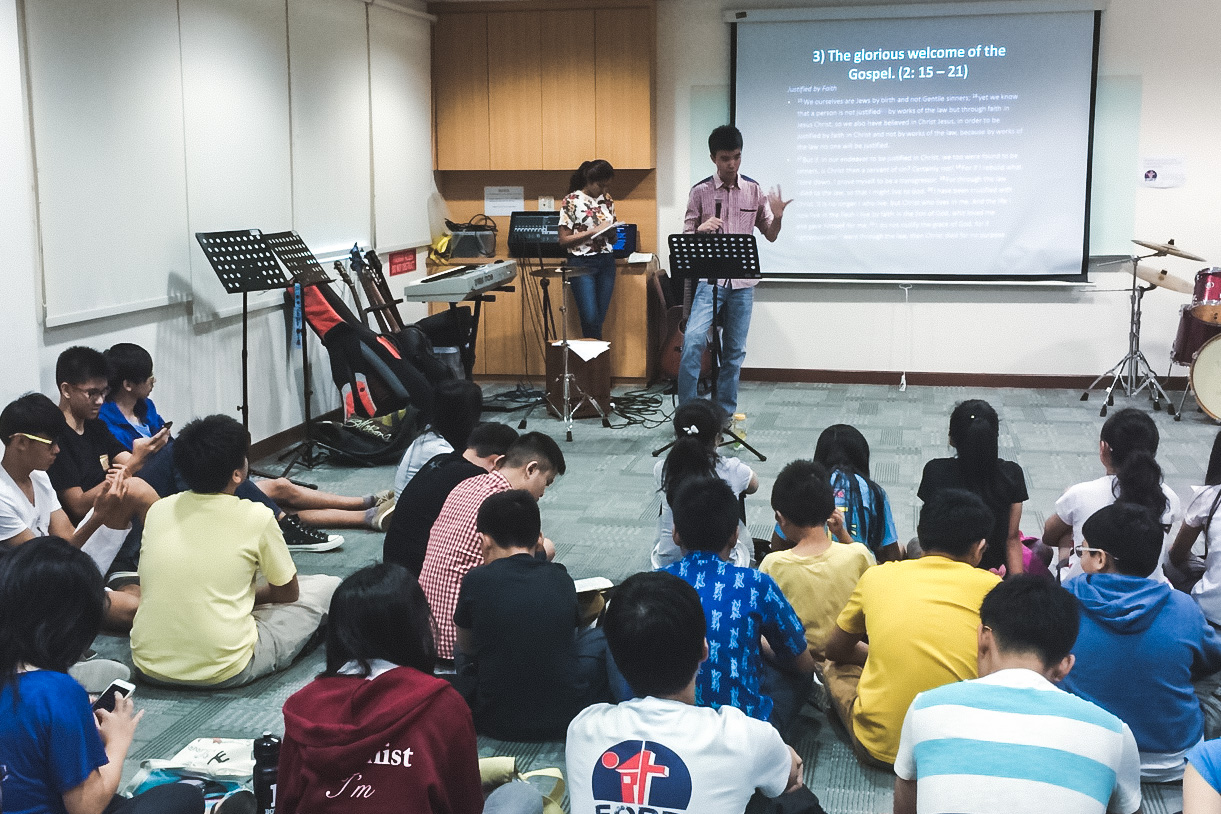JOSHUA KWOK is serving as a youth leader and youth committee member in the youth ministry of Ang Mo Kio Methodist Church. He recently graduated from NUS and is currently working in NTUC Union.
How did you end up in this ministry?
I grew up in church but growing up I didn’t feel connected to the community in church. So when I was Secondary 3, I decided to stop attending youth ministry and just attended the main service with my parents. I was very disconnected with the community in church and wasn’t living a God-directed life.
Towards the end of Junior College, an auntie who is a friend of my dad felt led by God to approach me to help her set up a youth ministry. I felt that this could have been God’s way of leading me back to Him, so I decided to help out.
At first, I was supposed to just help out, but as time passed by, I was given more responsibilities. As I became more exposed to God’s Word and as I saw the transformation that God was working in the lives of the youths, my passion for God increased. God also opened up many opportunities for me to serve, forcing me out of my comfort zone, leading me to depend on Him and to experience more of how great He is.
Did you ever encounter any personal struggles in your ministry?
One of the fears that I had was public speaking. I always had this fear that I wouldn’t know what to say when I was up on stage and the fear of that caused me to be nervous, and the nervousness just made it worse. It was like a self-fulfilling prophecy.
During my church’s youth camp in 2011, I was leading the “Faith in Action” committee, which aimed to expose our youths to some of the needy communities in Singapore. My Pastor asked me to share my “walking on water” experience of me leading the committee during one of his sermons. I remember editing my script a few times, and I found it very hard to focus on the worship session and his sermon as my fears kept ringing in my head.
But I kept praying and asking God for help, and I’m glad that I was given the courage to speak in front of the congregation.
In the years since, I’ve been given more opportunities to be in the spotlight, and I’ve become more confident in public speaking. Those fears have diminished over time. God has even given me ideas to speak ad hoc.
In fact, my fear is now the opposite – that there may be an increasing tendency to rely on my speaking skills to motivate or convince the crowd, instead of prayerfully relying on God to convict the crowd.
Do people have certain expectations from you because of your role in church?
When I was leading a Christian camp in school a year ago, a camper told me that he had this perfect impression of me – that I was this perfect guy walking rightly with God and also doing well in many other areas of my life. However, as he began to hear more of my sharing, he came to realise that I have many flaws and God’s grace is made perfect in my weakness.
Through that, God was exalted, not me.
We tend to hide behind a mask; we want others to think highly of us and take on more things than we can handle, when actually we are nearing burnout. We give others a false image of who we are.
It’s natural to have expectations about one another. When it comes to ministry and service, and those expectations come from a genuine desire to build up the church, I think it’s helpful.
The problem is not with expectations but with a mismatch of expectations. We tend to hide behind a mask; we want others to think highly of us and take on more things than we can handle, when actually we are reaching burnout point. We give others a false image of who we are. That’s the mismatch.
As long as we stay honest in our sharing, people will soon realise that we are all flawed and sinners, and it’s truly God’s grace that enables us to serve. Keep doing that and the expectation will eventually be correctly matched.
In your years of service, have you been derailed by pride?
About a year ago, God led me to start an outreach group in school with some of my friends. As the week passed, with our weekly broadcasts, more and more people caught the vision and joined us.
I began to realise I had slowly allowed my service to become my identity, and how much I loved the approval of man – like when others looked up to me for my perceived spiritual maturity. The success of my ministry both in church and in school has allowed pride to grow in my heart and to think highly of myself than I ought to.
God allowed me to see that even the good things I had set out to do for God had mixed motives. I had allowed pride and not God’s glory to be my satisfaction.
I was humbled. I began to see ministry very differently when I saw the sinfulness of my heart. So now, whenever I feel the tendency to fall into pride, I am reminded of the sinfulness of my heart and how much I need Jesus. I became more honest with God in my prayers, and that honesty brought me to a deeper level in my relationship with God.
How do you manage the tension between the attention you receive from serving in the spotlight and remaining humble and rooted at the same time?
We really need Jesus and only he can satisfy the longings of our hearts. That motivates me to continuing serving knowing that through service, others can enjoy God. At the same time, it’s really exciting to gain a deeper experience of who God is through service – He really amazes me as He displays His power.
I’ve learnt that it can be so dangerous if my heart is not in the right place. I can still disguise myself with knowledge, skill, ministry experience. But this actually does a lot of harm to the people I may lead, and to myself.
God allowed me to see that even the good things I had set out to do for God had mixed motives. I had allowed pride and not God’s glory to be my satisfaction.
Sin is very deceitful and it blinds our spiritual eyes easily. A spiritually blind person has the tendency to be blind to his own blindness.
Hence, I cannot be deluded that I know myself best, and I have to allow others to speak into my life. I allow both my mentors and close friends to speak into my life and to point out my blind spots. Placing myself in a position where I can be critiqued humbles me and allows me to receive so much more.
When I fall to pride, I’ve been put in many difficult situations where I’ve felt weak and needed to cry out to God for help, for His intervention.
The opposite of pride is humility. As C.S Lewis says, “Humility is not thinking less of yourself, but thinking of yourself less.” It’s important to then channel our thoughts towards God more often, because only the recognition of the awesomeness and beauty of God can kill our pride.
So I try to spend extended time with God. When I was still studying in school, I took a weekly Sabbath where I intentionally take time to spend extended time with God to reflect about who he is in my life and to allow him to point out areas where I need to repent as well.

Can you give some encouragement for other people in a similar position as you?
For those who serve in the spotlight, it’s very easy for our hearts to be thrilled by the approval of man, rather than the glory of God. So it’s very important to preach the Gospel to our hearts daily. We need to guard our spiritual disciplines with the intention of keeping our personal devotion and love towards God alive, always growing. Go out on “dates” with God and spend extended time with him in the Word and prayer.
Be encouraged in the knowledge that God will not leave us alone; he is in the process of transforming us into his likeness. He will intervene in your pride, and help you see your desperate need for His forgiveness and grace. What’s more important is how we respond to his intervention.
For those who serve in the spotlight, it’s very easy for our hearts to be thrilled by the approval of man, rather than the glory of God. So it’s very important to preach the Gospel to our hearts daily.
We all are very familiar with David, a godly man after God’s heart. But in one instance he succumbed to temptation, resulting in adultery with Bathsheba and the murder of Uriah. He was blinded to his own sins but God sent Nathan to help him see that he has acted wickedly against God. In response, David humbled himself and sought God’s forgiveness.
When we are blinded to our own pride, God will intervene to awake us from our blindness just as he did with David. And just like with Paul, whose thorn in the flesh prevented him from becoming conceited. In Paul’s weakness, God’s power was made perfect.
God will definitely put us in situations to humble us when we are falling into pride.









